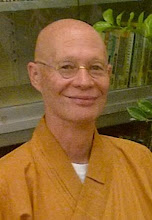
Mention the notion of Buddhist meditation and one most often conjures up the image of someone sitting in the lotus position, back straight, eyes closed and in peaceful contemplation - a perfectly normal and acceptable image. However, as most of us know who try to jam in twenty minutes or so of meaningful meditation in the morning before topping up the caffeine levels, racing out the door to pack into the bus or train or join the line of the other thousands of cars on the peak morning not-so-freeway bustle, finding the quality time to stay in tune with our Buddha consciousness can be quite a daunting task.
On the other hand Pureland Buddhism puts us in contact with the reality of each moment of the day, even during those stressful or irritating times hanging on the end of the phone line in the office while waiting for the automated voice telling you what number to press for half a dozen services you don’t want or feeling your blood pressure rocket past “normal” while waiting for the traffic to move past the tenth change of traffic signals. In fact, Pureland Buddhism is perhaps the most suitable method of practice for the modern era.
In my early days of practice of Pureland Buddhism I found I often bemoaned the seeming lack of time I had to practice meditation and Buddha Name recitation or “nien fo” as it is termed – that is until one day I discovered the wonderful Law of Downtime. It was before the time of the Navcom and I was racing out of the office to see a client in a southern Brisbane suburb. I failed to do my pre-drive check of the street directory instead navigating the car in a southerly direction. I soon realised I had no idea of where the destination address was so had to consult the street directory while at the same time steering the car. I am not sure if any of the readers of this blog have tried this (and I don’t suggest you do) but it is quite dangerous and difficult. Suddenly I found myself at a set of annoying traffic lights at an intersection I was acquainted with and I knew it normally takes what seems a millennium for the lights to change. So, I took this golden opportunity to consult the street directory. Well, you know what happened? Yes, you are right. The lights changed almost immediately just as I had fond page 230 in the street directory. At each set of lights the same thing happened leaving me no time to locate the destination address and plot a course. I could have sworn the Transport Department had changed the timing sequence on the lights! Alas! No! What had happened was that I had discovered the Law of Down Time: Traffic lights will always change quickly when to are pre-occupied with something else.
The central focus of Pureland Buddhism is to develop the Bodhi and Pure Mind through Buddha Name Recitation. “Once having developed deep Faith and earnest Vows you should hold on to the words “Amitabha Buddha” (Namo Amitofuo). Regardless of the occasion, weather walking or standing, sitting or reclining, speaking or remaining silent, moving about, meditating, dressing, eating, even when in the privy, you should keep the words “Amitabha Buddha” firmly in mind. You should exert yourself until the recitations are constantly before you, the whole Buddha is Mind, Mind and Buddha are one - reciting to the ultimate point where all mundane feelings are forgotten. At that time, the mind being empty, the Buddha appears. During this life you can attain the Buddha Name Remembrance Samadhi and at the time of death achieve rebirth in the upper lotus grades” - Master Yin Kuang, Pure-Land Zen, Zen Pure-Land, Letters from Patriarch Yin Kuang. The 13th Patriarch of Pureland Buddhism, Venerable Yin Kuang, makes it clear the necessity to hold the Buddha Name in all situations. If you become aware of Down Time you will find many such opportunities during the day: Standing in the line in the bank, waiting for traffic lights to change (they change a lot faster!!), waiting your turn at the check-out at the supermarket, waiting on the end of the phone, going through the security check at the airport, and so on it goes. Down-Time becomes the perfect opportunity for Buddhist Mindfulness practice.

Maximize your Down-Time moments for de-stressing instead of getting all wound up. Follow your breathing. Breathe in a gentle breath while in your mind saying “Amitofuo” (Amitabha Buddha). Allow the lungs to empty naturally while again holding the thought “Amitofuo”. Each breath: “Amitofuo”. If the mind pulls you into one of its stories simply acknowledge it by saying: “Thank you Mind” then continue the breathing and Buddha Name recitation. Observe how you feel at the end of each Down Time Session and make the Down-Time as an offering with deep thanks to the Buddha.
I invite you to make a written list of Down-Time opportunities in your day. No, don’t put it off until you have a moment. Do it now! – a short simple list is good to start with. You can add to it later when you discover more moments.
If you are not Buddhist you can still use this method adapted to your own faith tradition or simply to de-stress by doing some gentle awareness breathing. Notice what a difference to your day and your attitude it makes. Bring your meditation with you throughout the day and make a real difference to the world around you.
The line in the post office snaked its way out into the shopping centre mall. I closed my eyes and drifted deeply into my breath with the Buddha of Infinite Light and Life as my focus. Time stood still. All was gentle and peace. Suddenly I was aware of a soft tap on my shoulder: “Excuse me, Sir. It’s your turn.”






